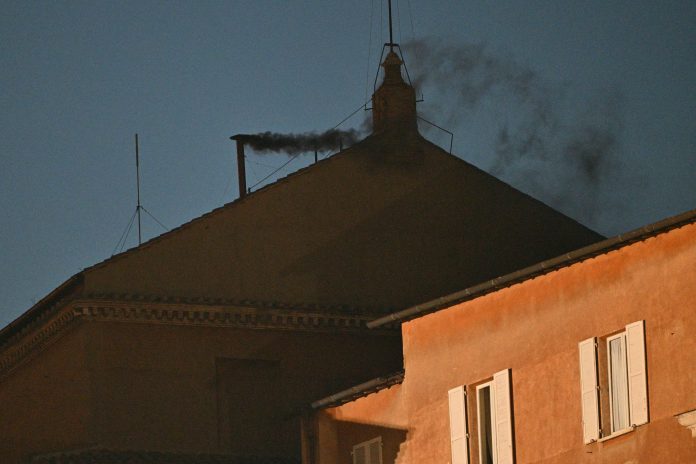The College of Cardinals failed to elect a new pope Wednesday, as black smoke signaled no clear majority in the first round of voting.
The smoke appeared more than three hours after the 133 electors were sealed inside the Sistine Chapel to begin the secret balloting process.
Following the inconclusive vote, the cardinals returned to the Santa Marta guesthouse, where they will remain in prayer and discernment. Voting is expected to resume on Thursday.
Cardinals under the age of 80 were summoned to Rome after the death of Pope Francis on April 21. Following centuries-old tradition, the electors will vote up to four times a day until one among them receives a two-thirds majority—89 votes—to become the next Bishop of Rome.
To preserve the sanctity of the process, the cardinals are locked away and cut off from the outside world. The results are communicated by burning the ballots: black smoke indicates no result; white smoke signals that a new pope has been chosen.
Thousands of pilgrims and onlookers gathered in St. Peter’s Square as the conclave began. The solemn rites, including a procession from the Pauline Chapel and the oath of secrecy taken beneath Michelangelo’s frescoes, were broadcast live on large screens outside the basilica.
After each cardinal took a personal vow of secrecy, the conclave’s master of ceremonies declared “Extra omnes”—Latin for “Everyone out”—and the chapel doors were shut.
As night fell, the crowd continued to swell. Hymns were sung, and people waited in prayer and anticipation. Minutes before 9 p.m., the Vatican’s video feed ended, and shortly after, black smoke rising from the chimney confirmed that the Church would wait at least another day for its new shepherd.
This is the most internationally diverse conclave in the Church’s history, with electors from nearly 70 countries. No clear frontrunner has emerged to succeed Pope Francis, whose 12-year pontificate emphasized social outreach, synodality, and reform.
The new pope will inherit significant challenges, including geopolitical instability, doctrinal tensions, fallout from the clergy abuse crisis, and declining participation in many Western nations.
As the Church awaits the outcome, Catholic communities around the world are turning to prayer.
In the Philippines, Bishop Danilo Ulep of Batanes invited the faithful to participate spiritually in the conclave.
“This is a moment of profound importance for the Church and for the world,” he said. “Let us pray fervently that the Cardinal-Electors may be enlightened with wisdom, courage, and humility, and that their choice may bring hope, renewal, and unity in the Church and in the world.”
He encouraged Catholics to pray the Rosary, attend Eucharistic adoration, and seek the intercession of the Blessed Virgin Mary and all the saints.
In India, Catholic bishops gathered for a special Mass during the 97th Executive Committee Meeting of the Conference of Catholic Bishops of India (CCBI) in Bangalore. The liturgy was offered for the successful election of the next pope.
With CCBI President Cardinal Filipe Neri Ferrão in Rome, the Mass was presided over by Archbishop Vincent Aind of Ranchi.
“You, Lord, who know the hearts of all, show which one of them you have chosen to be the successor of Peter,” the bishops prayed. “May the new Pope be a man of prayer, a servant of truth, gentle yet bold, compassionate, and deeply rooted in Your love.” – with reports from Agence France-Presse









